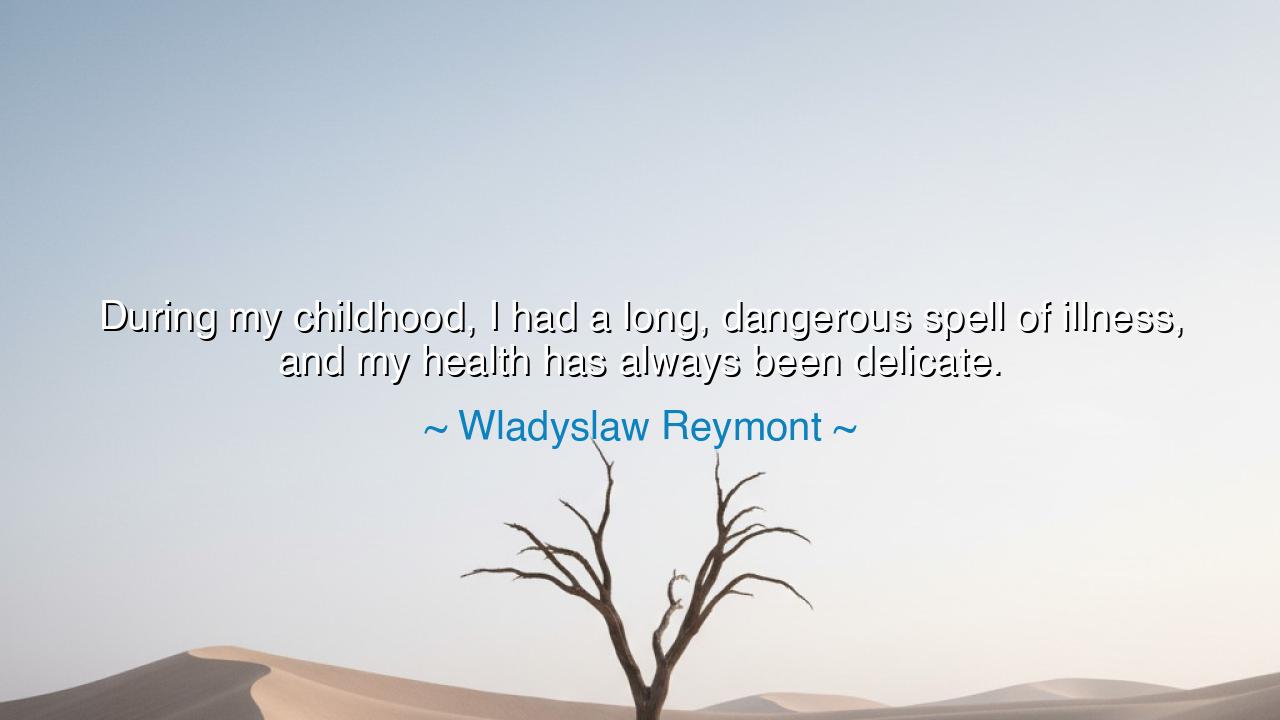
During my childhood, I had a long, dangerous spell of illness
During my childhood, I had a long, dangerous spell of illness, and my health has always been delicate.






In the quiet confession of Władysław Reymont, the Polish Nobel laureate, there lies a truth both fragile and profound: “During my childhood, I had a long, dangerous spell of illness, and my health has always been delicate.” To the casual ear, these words may seem a simple recollection — a statement of weakness, perhaps, or of misfortune. Yet beneath them lies a deep well of human experience: the understanding that frailty can forge strength, that suffering can become the seed of greatness. Reymont’s words, born of pain and endurance, speak not only of the body’s limits, but of the spirit’s astonishing capacity to rise beyond them.
The origin of this quote is rooted in the early life of Reymont himself — born into modest means in nineteenth-century Poland, a land still reeling under foreign occupation. His youth was shadowed by hardship and sickness, his delicate health a constant reminder of mortality. Yet it was through this very struggle that he developed a profound awareness of human fragility, an empathy that would later flow into his writings. In his masterpiece The Peasants, Reymont painted the rhythms of rural life with such tenderness and truth that he would one day be honored with the Nobel Prize in Literature. The body that had faltered became the vessel through which the human condition found voice. His words remind us that the flame of creativity often burns brightest in those who have walked through the valley of weakness.
When Reymont speaks of a “long, dangerous spell of illness,” he is not merely recounting a personal trial — he is offering a parable of endurance. Illness, in the ancient understanding, was more than a physical ailment; it was a test of the soul. The Greeks believed that suffering, pathos, was the forge in which ethos, the moral character, was shaped. So too was it for Reymont. Through his affliction, he learned patience, observation, and the humility that comes when one’s strength is stripped away. The delicacy of his health became the clarity of his vision; his vulnerability opened a window into the suffering and endurance of all humankind.
Consider the tale of Ludwig van Beethoven, who, though struck deaf in the prime of his life, continued to compose music that reached the heavens. His body betrayed him, yet his spirit expanded until it embraced the universe. In the same way, Reymont’s frailty did not diminish him — it refined him. The world often praises the strong and the swift, but history is equally shaped by those whose strength is unseen, whose victory is the quiet triumph of persistence. Illness may chain the body, but it can also free the mind to see the world not as it appears, but as it feels.
There is, too, in Reymont’s confession a deeper lesson about the balance between fragility and resilience. The human being, like a reed in the wind, survives not by unbending strength, but by the ability to yield and endure. A healthy man may believe himself invincible, but the one who has known sickness carries the wisdom of limits — the understanding that life is both precious and perilous. Reymont’s “delicate health” made him attentive to the subtleties of existence: the whisper of a breeze, the sorrow of the poor, the fleeting beauty of a sunrise. It is often those who have nearly lost life who understand its worth most profoundly.
In ancient times, the philosopher Epictetus, once a slave and crippled by his master’s cruelty, taught that true freedom lies not in the condition of the body, but in the mastery of the soul. “It is not things themselves that disturb men,” he said, “but their judgments about those things.” Reymont’s life reflects this Stoic wisdom. His delicacy became not a prison, but a passage — the narrow, difficult road through which his spirit attained depth and compassion. His illness was not his end, but his initiation.
So, O listener, take this truth into your own heart: do not despise your weakness, nor curse the times of frailty. Every wound can be a teacher, every limitation a mirror reflecting your true strength. If life lays you low, do not ask, “Why am I broken?” but rather, “What is life trying to show me through this?” For as Reymont’s life reveals, greatness is not always born from vigor — sometimes it rises from the quiet endurance of pain. The body may falter, but the spirit, once awakened by suffering, can become indestructible.
The lesson of Władysław Reymont’s words endures through the ages: that sickness and suffering, though bitter in their season, may ripen into wisdom and compassion if borne with patience. Do not measure your worth by the strength of your body or the ease of your days. Measure it instead by the depth of your seeing, the tenderness of your heart, and the courage with which you rise, again and again, from your frailties. For even the most delicate soul, touched by endurance and guided by purpose, can illuminate the world.






AAdministratorAdministrator
Welcome, honored guests. Please leave a comment, we will respond soon